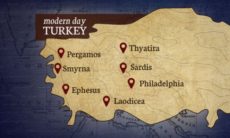How King David rose to be the King of Israel
David’s Father was Jesse. At the time, Saul was Israel’s first king. Samuel was a pronounced prophet of the time who had anointed King Saul (1 Samuel 10:1) into a position of leadership. Souls disobedience causes him to be dethroned from leadership and to be replaced with King David
Saul’s First Disobedience (1 Samuel 13:8-14)
While Saul was a reasonably effective military leader, it became clear that his love for the Lord wasn’t strong, nor was he very careful about obedience to God’s direction through the prophet Samuel. The prophet had told him to wait as long as seven days for Samuel to offer a sacrifice to the Lord, before the army went into battle with the Philistines (Samuel 13:8-13). But the prophet didn’t come within that time — Saul’s troops were beginning to go home — so Saul offered the sacrifice himself. Just then Samuel appeared and told him,
“You acted foolishly. You have not kept the command the LORD your God gave you; if you had, he would have established your kingdom over Israel for all time. But now your kingdom will not endure; the LORD has sought out a man after his own heart and appointed him leader of his people, because you have not kept the LORD’s command.” (13:13-14)
Saul’s Second Disobedience (1 Samuel 15:1-21)
The second time Saul disobeys the command of the Lord concerned the Amalekites, an arch enemy of Israel. This was a tribe that had attacked the children of Israel in the wilderness as they were escaping from Egypt under Moses (Exodus 17:8-16). Saul was told to attack the Amalekites and “totally destroy everything that belongs to them,” including their cattle (15:2-3). But Saul fails to obey fully. He preserves all the Amalekites’ cattle!
The word of the Lord comes to Samuel at night:
“I am grieved that I have made Saul king, because he has turned away from me and has not carried out my instructions.” (1 Samuel 15:11a)
God isn’t just looking at Saul’s disobedient actions. He also sees Saul’s heart that prompts this kind of disobedience — and is grieved!
Samuel 16: 14; “Now the Spirit of the LORD had departed from Saul, and an evil spirit from the LORD tormented him.”
God instructs prophet Samuel to go to Bethlehem.
Let us look at 1 Samuel 16:3-13 (NIV)
3 Invite Jesse to the sacrifice, and I will show you what to do. You are to anoint for me the one I indicate.”
4 Samuel did what the Lord said. When he arrived at Bethlehem, the elders of the town trembled when they met him. They asked, “Do you come in peace?”
5 Samuel replied, “Yes, in peace; I have come to sacrifice to the Lord. Consecrate yourselves and come to the sacrifice with me.” Then he consecrated Jesse and his sons and invited them to the sacrifice.
6 When they arrived, Samuel saw Eliab and thought, “Surely the Lord’s anointed stands here before the Lord.”
7 But the Lord said to Samuel, “Do not consider his appearance or his height, for I have rejected him. The Lord does not look at the things people look at. People look at the outward appearance, but the Lord looks at the heart.”
8 Then Jesse called Abinadab and had him pass in front of Samuel. But Samuel said, “The Lord has not chosen this one either.” 9 Jesse then had Shammah pass by, but Samuel said, “Nor has the Lord chosen this one.” 10 Jesse had seven of his sons pass before Samuel, but Samuel said to him, “The Lord has not chosen these.” 11 So he asked Jesse, “Are these all the sons you have?”
“There is still the youngest,” Jesse answered. “He is tending the sheep.”
Samuel said, “Send for him; we will not sit down until he arrives.”
12 So he sent for him and had him brought in. He was glowing with health and had a fine appearance and handsome features.
Then the Lord said, “Rise and anoint him; this is the one.”
13 So Samuel took the horn of oil and anointed him in the presence of his brothers, and from that day on the Spirit of the Lord came powerfully upon David. Samuel then went to Ramah.
Prophet Samuel anoints David as King
We see that prophet Samuel has Jesse bring forward all his sons. When Samuel sees the firstborn, Eliab, he is sure he sees kingly material in this handsome man. But the Lord rebukes him inwardly — certainly not aloud!
When they came, he looked on Eliab and thought, ‘Surely the LORD’s anointed is now before the LORD.’
7 But the LORD said to Samuel, ‘Do not look on his appearance or on the height of his stature, because I have rejected him; for the LORD does not see as mortals see; they look on the outward appearance, but the LORD looks on the heart.
This scene sounds like us. We’re so used to judging by means of our physical sight and our social experience that it’s easy to get it wrong when it comes to spiritual things. We need spiritual sight and discernment so we can see like God sees (the heart). Samuel has natural instincts but is mature enough to listen to the Holy Spirit and hear God’s voice, to base his actions on what he hears from God.
Samuel goes through all the sons without God giving him the internal go-ahead. “Is there another son?” he asks. “Oh, the youngest,” says Jesse, “but I didn’t think he was important enough to bring to the feast.”
Yet David, the youngest and least important in the family, is the one God has chosen.
1 Samuel 16:3-12) How does this story teach us the importance of listening carefully to God’s voice? What is our instinctive way of discerning? How is God teaching us to discern? How do we learn to listen to the Spirit?
From the anointing performed upon David by Samuel the prophet – 1 Samuel 10:1-13, David grew in his anointing and resultant authority and influence.
The Five-Fold Levels of Anointing Upon King David
- Anointing to Kill the Lion and the Bear
After the first anointing, which took place among his brothers, David killed a lion and a bear. God first tests believers with small things before they are promoted (Luke 16:10).
- Anointing to Defeat Goliath
After his success in killing the lion and the bear, David overcame a supernatural battle by killing Goliath. If he had not exercised his Godly anointing by killing the lion and the bear, he would not have had the courage to face Goliath (1 Sam. 17:34). No one took the challenge of this Philistine, including King Saul. This brought about promotion and soon David was eating with King Saul and ministering to him.
- Anointing to Lead an Army
David’s time in Saul’s court developed him further. Evading murderous threats and actions was an experience new to the shepherd boy turned court minstrel. When personal elevation is due to God-given victories, a spirit of jealousy can be released from those who once had the anointing and who came to know the value of what they had only after they had lost it.
Pursued by a jealous King Saul, David fled to the cave of Adullam, where his family joined him along with a number who were distressed, in debt, or discontented. After many years of struggling to survive, during which he refused to kill Saul, David faced his greatest test to stay alive as well as to stay free of bitterness. The anointed upon his life kept him from harm by the thousands of soldiers in Saul’s army, who were in hot pursuit of him every day.
David moved in the favor and power of God when he pursued the Amalekites and recovered everything and everyone that had been taken. David progressed beyond his first anointing – from shepherd boy to national hero; from the leader of 400 rebels to a warrior able to recover quickly from grief and win back more than he had lost. Along the way, David remained true to God’s promise that he would fulfill his divine purpose and Israel and refusing to fight King Saul, even though he had the full mandate to rule when the prophet Samuel poured oil on his head.
- Anointed as the King of Judah
Soon after, King Saul and three of his sons died in a fight with the Philistines and David’s life as a fugitive came suddenly to an end. Leading the distressed debt-ridden and the discontent misfits into a 400-strong fighting force developed David even more. Mastering the temptation to kill Saul when the opportunity presented itself did likewise. Defeating discouragement at Ziklag (1 Sam. 30:1), which was a far greater giant than Goliath, was David’s final, first-level step. His days as a hated, hunted fugitive were at last over.
Although David was the anointed king by the prophet Samuel, David’s initial development in the anointing took place while hiding from Saul. On learning of the king’s death, David asked the Lord for direction and was guided to Hebron which was a town belonging to Judah, his own tribe.
Then the men of Judah came to David and they anointed David king over the house of Judah (2 Sam. 2:4).
Although David was no longer a king without a kingdom, his reign was to be a limited, tribal one for the next seven years. Judah was much smaller than the kingdom God had promised him. To David, however, a portion of the kingdom was better than no kingdom at all. After having kept his family and 400 others safe while being hunted in the wilderness, he could keep safe his family and his followers in the territory of his own tribe.
5. Anointed as the King of Israel
King David reigned for 40 years, from the age of 30 until the age of 70. The waiting period from first to final recognition was at least 20 years. Those were years spent developing in the anointing.
However, this new level of responsibility brought change. Instead of random skirmishes, there was a long war between the dynasties of Saul and David. (2 Sam. 3:1) But as David grew stronger and stronger, the house of Saul grew weaker and weaker because David’s house had an anointed king.
Saul’s dynasty died with Ishbosheth. All the tribes of Israel came to David after the death of Saul’s son, Ishbosheth and recognised his right to rule, and swore loyalty to him. Acknowledging his past leadership and faithfulness to Saul, they also remembered that, through the prophet Samuel, God had long before chosen him as their rightful king (2 Sam. 5:3).
David’s Successful Achievement
In just 20 years, David had developed in the anointing, from potential king to nominal king to actual king. He had grown from shepherd to warrior to ruler. He had been recognized by his family, his tribe and his nation.
How the anointing upon King David apply to believers today
It is possible to begin ministry as a person with potential, winning small but important victories – as David did over the bear and the lion – without continuing to develop in the anointing. It is important to go beyond the initial empowerment (Acts 2:4) and develop a continuous relationship and intimacy with the Holy Spirit.
God’s anointed followers can and should develop in the anointing by degrees. Experiences in the anointing are progressive and steps to higher levels. David’s first steps were the killing of a lion and a bear, and led him to the next level, the conquest of Goliath. Israel’s inability to face the giant Philistine was the result of the nation’s longtime failure to deal with its fears (Num. 13:33).
Many of David’s actions portrayed those of the coming, greater Son of David, Jesus Christ. David’s victory over Goliath portrayed Christ’s victory over Satan. Since David was a prophet, much of what he said and did was prophetic (Acts 2:25-31). David was anointed three times – the second, among his tribe, and the third, among his nation, confirming the first, which had been among his family. Each was a further, and wider, recognition of David’s right to rule.
Although he was anointed five times, David did not have five anointings! The Bible speaks of “the anointing” which is singular in meaning. However, the gifts are plural. One anointing but many expressions.
Click the links below to see the latest posts
Download Audio
Download PDF









